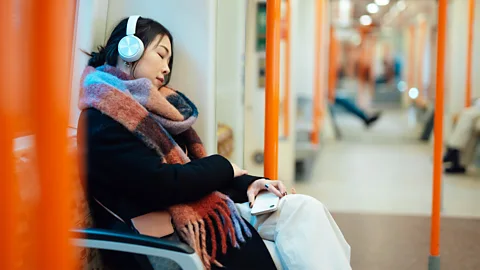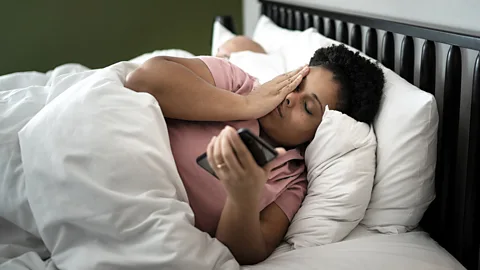Need a good night's sleep? Try changing how you think about it
 Getty Images
Getty ImagesOur hectic modern lives can often leave us feeling sleep-deprived, but what if much of a good night's sleep was down to our state of mind?
How did you sleep last night? If you tossed and turned, or stared at the clock, it's likely you'll probably feel less-than-refreshed. But that groggy, tired feeling may not just be down to the quantity, or perhaps even the quality, of your sleep – it can also depend on your mindset. Because what you tell yourself the next day about how you slept, and about how much it matters, can make a difference to how you perceive your tiredness.
"Everybody knows the idea of sleep quality. They assume that it is based on people's sleep performance during the night, as something that you can measure," says Nicole Tang, director for the Warwick Sleep and Pain Lab at the University of Warwick in the UK. "But what happened afterwards, and what happened just before, could also have an influence."
Tang's own work in this area is part of a growing body of research that suggests sleeping through the night isn't the only key to feeling refreshed the next morning. Our perception of sleep, our mood when assessing how tired we are and what we are doing at that time can all make a difference, Tang and her colleagues say.
The idea that mindset directly affects our sleep isn't new. Decades of research has largely agreed that, in fact, psychological processes are likely the main driver behind insomnia: our sleep is disrupted when we're in an elevated state of psychological arousal, which often results from our thoughts, beliefs, and how we focus our attention.
Still, many of us would assume that, if we feel tired, it's because we slept poorly – tossing and turning all night, unable to fall into the kind of rejuvenating slumber we all hope for.
For decades, however, a phenomenon often called "paradoxical insomnia" has puzzled scientists. This is where people believe they had a poor night of sleep, feel fatigued – and yet when their sleep is objectively measured, such as with polysomnography, it is within the normal range. This state may be more common than people realise. Some research suggests it could apply to the majority of insomnia cases. One systematic review of studies identified the findings on prevalence among insomnia patients as ranging from 8% to 66%.
To be clear, insomnia, and its potential risks, are very real. And no one would argue that, if you consistently feel tired, you shouldn't make whatever tweaks to your sleep that you can. But the idea that how we view a bad night's sleep could change how tired we feel is an intriguing, and potentially empowering, consideration. At best? It means you might be able to feel more awake without having to clock up more hours of shut-eye.
The problem of sleep problems
This approach can conflict with what we're often told about sleep: namely, that consistently logging a certain number of hours, without wakes, is absolutely crucial to well-being, one of the main ideas driving a $78bn (£58bn), and growing, industry. In fact, experts say, the exact relationship between sleep duration and our long-term health remains unclear. The research tends to be mixed and even when a link is found, studies generally highlight associations between sleep and health, rather than causations. In other words, the lack of sleep could be the cause of the problem, or it could be down to an underlying issue that keeps someone from sleeping well – people with respiratory problems, for example, often suffer poorer sleep.
 Getty Images
Getty Images"We're problematising our sleep," says David Samson, an evolutionary anthropologist and director of the Sleep and Human Evolution Lab at the University of Toronto, as well as author of the forthcoming book The Sleepless Ape: The strange and unexpected story of how social sleep made us human. By using objective measures such as actigraphy, which monitors activity and rest cycles, he and other researchers have found that people from hunter-gather societies typically get between 5.7 and 7.1 hours of sleep per night – on the lower end of the scale compared to industrial societies. Their sleep is also more fragmented.
But it also doesn't bother them, says Samson. Of two groups he looked at, in Namibia and Bolivia, less than 3% of foragers said they had trouble falling, or staying, asleep – a fraction of the up to 30% reported in industrial societies. Neither group had a word for "insomnia" in their languages.
"When I ask them 'Are they happy about their sleep? Are they satisfied with their sleep? Is sleep okay">window._taboola = window._taboola || []; _taboola.push({ mode: 'alternating-thumbnails-a', container: 'taboola-below-article', placement: 'Below Article', target_type: 'mix' });
